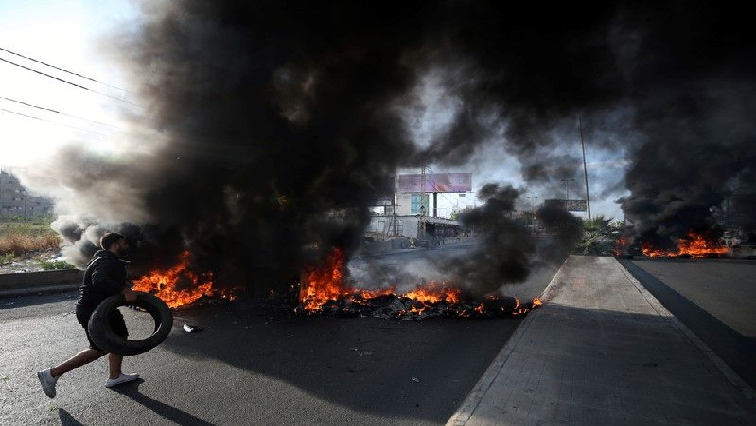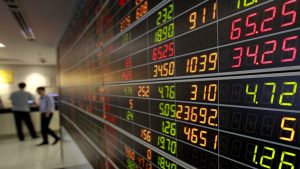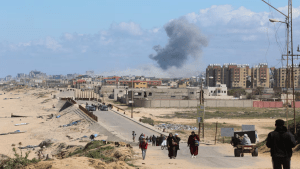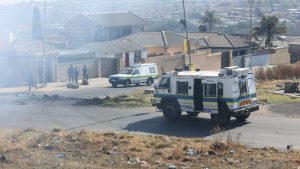Lebanon’s central bank governor said on Monday a solution must be found in days to a crisis unleashed by huge protests against the ruling elite, saying this would restore confidence and avoid any future economic collapse.
With banks closed for a ninth working day, Riad Salameh also told Reuters there would be no capital controls or “haircut” when they do reopen, and the value of the pegged Lebanese pound would be maintained.
“I am not saying that we are going to have a collapse in a matter of days, I am saying we need to have a solution in a matter of days to regain confidence and avoid collapse in the future”, Salameh added.
Salameh spoke after giving an interview with CNN which cited him as saying Lebanon was days away from economic collapse. Salameh said the headline did not reflect what he had said.
Lebanon’s eurobonds suffered a sell-off on the comments.
The crisis has paralysed Lebanon, closing banks, schools and some businesses. There is no sign of the government giving ground to protesters, whose demands include its resignation.
Protesters set up new roadblocks early on Monday to keep pressure up, defying security forces who deployed in larger numbers and tried again to re-open roads, but under orders not to use force.
The protests, now in their 12th day, were smaller on Monday than in recent days.
The protesters accuse ruling politicians of rampant corruption and steering Lebanon towards an economic collapse not seen since the 1975-90 civil war. Lebanon is one of the most heavily indebted states in the world.
“SATISFY THE PEOPLE”
Salameh called for “quick solutions that satisfy the people” and create hope.
Lebanese banks said on Monday they would ensure public sector workers were paid their salaries.
“The banks are closed by their own decision due to the situation in the country and they will reopen as soon as the situation calms down. We didn’t ask them to close,” Salameh said.
“The opening will be coordinated with them,” he told Reuters by telephone. “Our objective is to protect the depositors money and the banking system and we will do the necessary for that.”
Asked if there would be capital controls when banks reopen, he said: “No. There is no capital control and no haircut”.
Lebanon’s banking association said banks would remain shut on Tuesday for a 10th working day, but said the central bank had provided the liquidity necessary to pay out salaries for public sector workers, including security forces.
Banks have previously said they will ensure people receive their end-of-month salaries through ATMs. The banks have said they are staying closed out of concern for the safety of customers and employees.
Bankers and analysts have also cited wide fears depositors will try to take out their savings when banks reopen.
Gabriel Sterne, head of global macro research at Oxford Economics, said Lebanon is facing a “bank jog”, rather than a full-blown bank run. He added that capital controls were needed in the short-term, but can also scare away investors.
Capital inflows needed to finance the state deficit and pay for imports have been slowing, generating financial pressures not seen in decades, including the emergence of a parallel market for dollars in recent months.
While Lebanon’s pound currency is officially pegged at 1507.5 to the dollar, parallel market rates have risen in recent months.
One market source quoted a price of 1,700 pounds to the dollar, while a second quoted 1,740, a roughly 15% premium on the official rate.
The International Monetary Fund (IMF) said it was evaluating an emergency reform package the Lebanese government announced last week, but which has failed to defuse the popular anger or reassure foreign donors.
Asked if Lebanon would have to go to the IMF or other international institutions, Salameh said: “The government has to decide what it wants to do, but I don’t want to speculate.”
Prime Minister Saad al-Hariri’s coalition government last week announced a package of measures aimed at appeasing protesters and implementing long-delayed reforms to plug gaping holes in the state budget.
The measures include a $3.4 billion contribution from the central bank and commercial banks towards reducing next year’s budget deficit.
Salameh said the sum includes the central bank reimbursing the government with interest paid on Lebanese pound debt held by the central bank, in addition to a tax on bank profits.
“This is for one year because during this year they will execute the remaining items that are on the item they approved,” he said.






